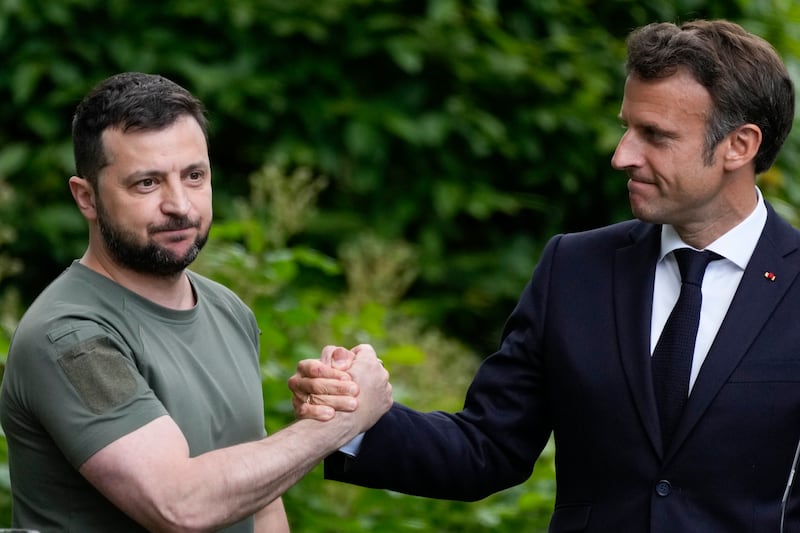Tensions are mounting over the International Olympic Committee’s efforts to end the ban on Russian athletes competing in time for the 2024 Summer Games in Paris, with a top Ukrainian sports official threatening a boycott.
It was the IOC that called for Russian and Belarusian athletes to be barred from international competition in February 2022, shortly after Russia invaded Ukraine with assistance from neighboring Belarus.
But with qualifying events for the Paris Olympics starting, the IOC declared in a statement last week, “No athlete should be prevented from competing just because of their passport,” and called for the further exploration of “a pathway” for Russian and Belarusian athletes.
That would include requiring them to compete neutrally, with no flags, colors, anthems or other signifiers of their countries, and they could not have actively supported the war against Ukraine.
The IOC’s move to reverse the current ban has sparked outrage among Ukrainian leaders.
Ukrainian President Volodymyr Zelenskyy started off his nightly address to his nation last Friday by slamming the IOC’s shift in position, stating it’s “obvious that any neutral flag of Russian athletes is stained with blood.”
Zelenskyy, who a year before the war had pitched Ukraine to IOC leaders as a site for a future Winter Games, invited IOC President Thomas Bach to visit the frontlines of the battle with Russian troops to “see with his own eyes that neutrality does not exist.”
The Ukrainian president did not mention a boycott of the upcoming Olympics, however. That threat came from Ukraine’s sports minister, Vadym Guttsait, in a Facebook post last Thursday.
“Work is currently underway on further possible steps,” Guttsait, who is also president of the National Olympic Committee of Ukraine, said, adding, “If we are not heard, I do not exclude the possibility that we will boycott and refuse to participate in the Olympics.”
He pointed out only three national Olympic committees — from Russia, China and the United States — were invited to participate in a summit convened by the IOC in December with various other sports organizations to discuss the situation.
The Chinese Olympic Committee is backing Russian and Belarusian athletes competing neutrally at this fall’s 2023 Asian Games in Hangzhou, China, as a first step toward the Paris Olympics, according to the South China Morning Post.
“Whether they participate or not should be determined based on sports performance, without interference from political and war factors,” a Chinese Olympic Committee spokesperson told China’s state media.
The U.S. Olympic and Paralympic Committee appears to be taking a more cautious approach. Los Angeles will hold the 2028 Summer Games that follow Paris, and Salt Lake City is bidding to host either the 2030 or 2034 Winter Games.
In a letter dated last Thursday to athletes and sports organizations obtained by the Deseret News, new USOPC Chairman Gene Sykes said U.S. Olympic officials have “encouraged the IOC to continue exploring a process that would preserve the existing sanctions.”
That would ensure “only neutral athletes who are clean are welcome to compete,” he said. The sanctions reaffirmed by the IOC last week include Russia or Belarus never being identified as well as prohibiting international sporting events in those countries.
Russia has been under IOC sanctions for athlete doping for a number of years, competing in several previous Olympics under various names, including as the Russian Olympic Committee at the 2022 Winter Games in Beijing.
Sykes said any process that allows Russian and Belarusian athletes to compete “will require careful management and will demand extra efforts to earn the confidence and trust of our community.”
In the U.S., he said there’s “a real desire to compete against all the world’s best athletes — but only if that can happen in a way that ensures safe and fair play. And there is very real concern, even skepticism, about whether that condition can be met.”
After the December summit, Sykes’ predecessor, Susanne Lyons, told reporters the USOPC and other participants agreed the IOC could pursue permitting Russian and Belarusian athletes to compete “in the best long-term interest of the movement.”
She called the effort an attempt at “reunification, not necessarily by welcoming the countries back in but by finding a way for their athletes to participate,” adding, “we don’t want to hold the individual athletes accountable for the actions of their governments.”
Lyons said then that “there are countries at war everyday and if people begin to kind of decide they want to boycott things, do a tit-for-tat ... very quickly the whole fabric of the Olympic and Paralympic movement falls apart.”
The United States and more than 60 other nations boycotted the 1980 Summer Games in Moscow to protest Russia’s invasion of Afghanistan. Four years later, the then-Soviet Union led more than a dozen nations in a boycott of the 1984 Summer Games in Los Angeles.
Last year, the U.S. and several other countries sent athletes, but not diplomats, to the Olympics in Beijing to protest China’s human rights record. IOC leaders, including Bach, have said the United States should have shown more support for China’s Winter Games.


